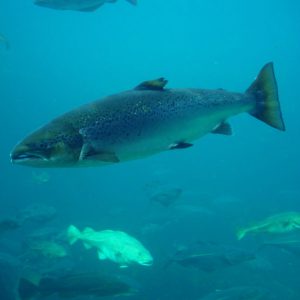Telling Our Story to Build Sustainable Sea-Run Fish Populations in Maine
Institution: University of Maine
Sponsor: Senator George J. Mitchell Center for Sustainability Solutions
A collaborative project to improve communication and outreach about sea-run fish in Maine.

Maine’s rivers and streams are home to twelve native species of sea-run (diadromous) fishes, which migrate between freshwater and marine environments to complete their life cycles. These species provide ecological linkages between freshwater and marine biomes and have cultural, social and economic value to the Indigenous and non-Indigenous people of Maine. With the complex nature of the biology and ecology associated with Maine’s sea-run fish, combined with the longevity of human interaction, the research, management and restoration communities comprise a broad diversity of players, including Tribal Nations, state and federal government agencies, conservation organizations, and local champions.
The Telling Our Story Workshop series represents a participatory and collaborative endeavor to understand and address the communication and outreach needs of sea-run fish practitioners in Maine. The team leading this effort is comprised of members of major partner groups in sea-run fish research and restoration.
This project was initiated in March 2021, when the project team brought together a wide array of people representing various Wabanaki Nations and government and non-government groups involved in the restoration and management of sea-run fish. This meeting resulted in a list of more than 40 topics related to challenges and successes in communicating elements of sea-run fish research and restoration, from which the project team identified seven themes. In the team’s second workshop in May, an even broader segment of the sea-run fish community was convened. Participants learned ways to explore storytelling and messages from communications expert Brooke Tully, and prioritized themes that were most relevant to them, resulting in a set of five focused topics for further exploration.
With support from the Mitchell Center, in the summer of 2021 participants will work collaboratively in small groups guided by Tully to identify audiences and begin the process of developing messages to motivate action in support of sea-run fish conservation, restoration and management. This work will form the basis of continued collaboration among sea-run fish partners.
Project Lead
- Danielle Frechette, Maine Department of Marine Resources, Division of Sea Run Fish and Habitat
Research Team
- Justin Stevens, Sea-Run Fish Ecosystem Program Coordinator, Maine Sea Grant
- Angie Reed, Water Resources Planner, Department of Natural Resources, Penobscot Indian Nation
- Max Tritt, Fisheries Biologist, NOAA Fisheries, Greater Atlantic Regional Field Office
- Sarah Bailey, Engagement and Outreach Specialist, NOAA Fisheries Affiliate, Greater Atlantic Regional Field Office
- Molly Payne Wynne, Freshwater Program Director, The Nature Conservancy in Maine
- Melissa Flye, Ph.D. student, Ecology and Environmental Sciences, UMaine
Project Partners
- Maine Department of Marine Resources
- Maine Sea Grant
- Penobscot Indian Nation
- NOAA Fisheries, Greater Atlantic Regional Field Office
- The Nature Conservancy in Maine
